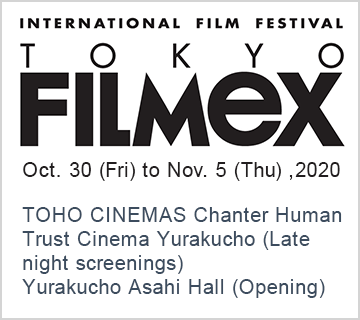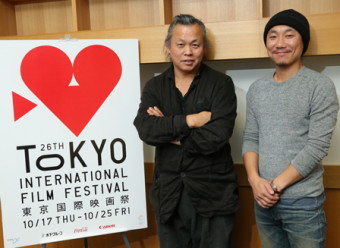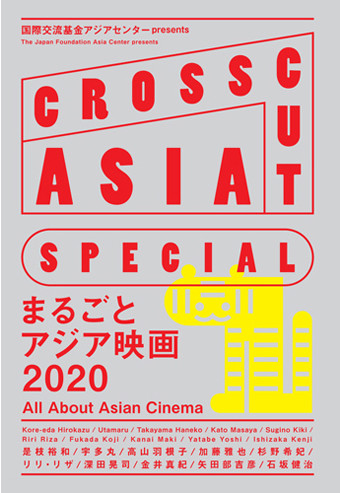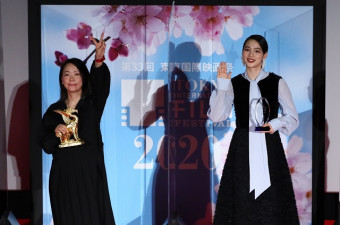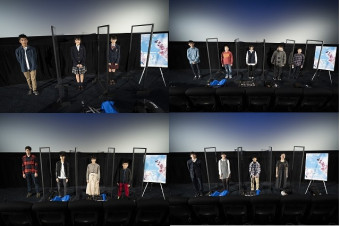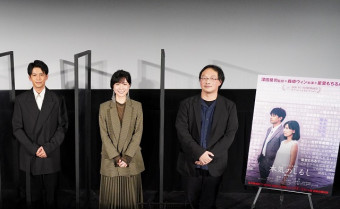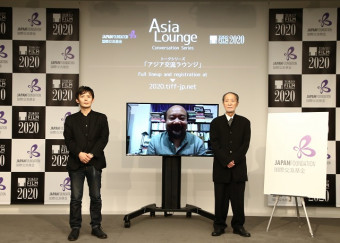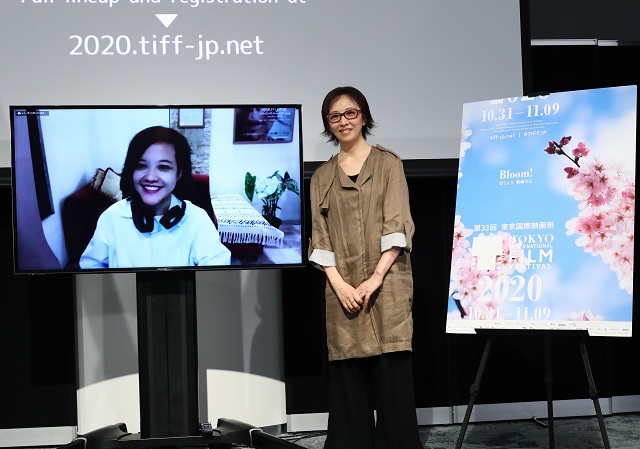
The new “Asia Lounge” Conversation Series continued for the fifth night on November 5 with a lively discussion between two visionary female creators, Mouly Surya, tuning in remotely from Indonesia, and Japan’s Yang Yonghi, appearing in person in Tokyo along with moderator Kenji Ishizaka, Senior Programmer of the Tokyo International Film Festival.
The series, being co-presented by The Japan Foundation Asia Center and TIFF nightly through November 8, was proposed and co-organized by Cannes Palme d’Or winner Hirokazu Kore-eda to give leading Asian film directors and their Japanese peers a chance to meet and chat about their work. It is being held online this year due to Covid, with audiences around the world able attend via a TIFF Webinar link and to participate in the Q&A session.
Following preliminaries, Ishizaka apologized for being an “ojisan” (middle-aged male), and asked the directors to comment on how they felt seeing each other’s work, since they have not yet met in person. Yang said, “I saw all three of Mouly’s films, and I was very impressed. Film festivals discovered and nurtured you, and I could see how much you grew in between each film. I thought they were all very original, and I felt the characters and music were great. I think they could even have been dialogue free, because the visuals were stunning.”
Surya’s films, Fiction (2008), What They Don’t Talk About When They Talk About Love (2013) and Marlina the Murderer in Four Acts (2017), have won numerous local and international awards, with the latter premiering at Cannes, winning the Tokyo Filmex Grand Prix, and going into theatrical release in 14 countries, including USA, Canada, and Japan.
Yang described the woman at the center of Marlina, who decapitates a man who has raped her, and noted, “This woman is very tough. She stands up and fights, and she’s so unforgiving. The men in the film are all bastards, and there’re some violent scenes but you can laugh most of the time. I thought everything about the film was perfect, really. In all three films there are women who are so unique. Despite being set in Indonesia, the themes are all universal and everyone can appreciate them.”
Surya was delighted. She admitted, “I have some distance from my films by now, and compliments mean a lot to me because it’s giving me motivation to continue making films. Not many people in Indonesia like these kinds of films, so I really embrace the kind of audience who can appreciate them, like at TIFF and Tokyo Filmex.”
She then praised Yang’s award-winning Our Homeland (2012), which won the CICAE Art Cinema Award at the Berlinale, among other honors, and was Japan’s official Oscar submission. “It was very beautiful, very emotional,” she told her. “You convey such sensitivity and everything feels so real. I read that you made documentaries before, and it feels like there’s a whole universe that you’ve captured. I didn’t know much about North Koreans in Japan and I learned a lot from the film. The writing grabbed me from the beginning. The story is different, but it feels familiar.
“I think it’s amazing when a filmmaker can share a part of her life on film. As I gain more experience, I tend to be more careful about putting too much of myself into my work. I’m afraid of it, so I think you’re very generous to share that.”
Yang laughed, “It’s like a mutual admiration society here, but I’m very glad, thank you. I’d wanted to make Our Homeland for a long, long time. It’s based on my own story and I went through periods where I would cry and drink too much during the process of writing the screenplay. When I’d cast the actors, I asked them not to study too much about Korea, to act like a typical Japanese family.”
She then recalled what it was like when she was making such documentaries as Dear Pyongyang (2005) and Sona, the Other Myself (2009): “Many people who saw them told me ‘Your family’s so different, I didn’t know this type of family exists in Japan!’ But this is just a normal family, it’s quite a universal family. There are many people around the world who can’t meet each other for a variety of reasons. In my film, they’re Korean, and there are thousands of Koreans in Japan, even though they’re a minority. But this is still a ‘normal’ family, and when the Japanese actors portraying them, Sakura Ando and Arata Iura, said they wanted to act like a typical [brother and sister], I was really happy to hear it.”
She continued, “It’s true that our films are different, but in terms of women’s position in society, I have family living in the North Korean way, in which there’s a patriarchy and women must obey men. But the character of Rie, in my film, she’s actually rebelling. In your film, as well, Marlina is rebelling in order to stay true to herself. I feel like this sense of loyalty to oneself is the same in both of our films.”
Surya nodded and said, “I always get asked whether I put myself into my films, but I don’t really think so. At least when I try to put myself in, I can’t. But I felt that Rie might be like a personification of your own character.”
The Indonesian director noted that she’d never made a documentary, and said, “I’m always intrigued by filmmakers who can do both, because I feel like it uses a different muscle. You’re telling your own story in a variety of mediums, from documentary to narrative film to books. What’s your process?”
“First, I start with writing a book and then I don’t have to worry at all about the budget,” explained Yang. “It’s total freedom. You can do whatever you want in a novel. It’s difficult to compare documentary and narrative filmmaking. For 10 years, I worked on documentaries and I never directed my ‘stars.’ It’s quite a violent way of making films because you barge into people’s lives, shoot them and then you cut and add music and you’re [manipulating] those lives.
“For Our Homeland, I had a very low budget and only 14 days to shoot. And I had to direct actors. On the first day, no matter what I said, the crew buzzed around, which surprised me. There was this scene at a table, and I noticed that the bottle of sesame on the table was too small, since Korean families always have big bottles. The crew ran out right away and replaced it, so I guess they had a hard time with me.”
Warming to her subject, she went on: “With documentaries, you write the screenplay as you’re going along; whereas you have to write the screenplay first for fiction features. I’m making another documentary right now and I’m also writing a new fiction film. With documentaries, you ask questions of people, and they answer in front of the camera. But they often don’t tell you the truth. You must put the camera down, and then they’ll answer truthfully.
“So I realized you have to write a narrative film to tell the truth. I feel like my documentaries are not necessarily depicting the truth, whereas in my fiction, the dialogue can speak the truth.”
Surya asked what Yang’s experience had been as a female filmmaker. She responded, “I actually haven’t thought much about the difference between male and female filmmakers, but there are lots of female directors in Japan these days. What’s difficult for me is that I’m using my background in my films, and not many people know much about the North Korean experience in Japan, so I have to explain so much to get a film made. I think that means we need to write more books and make more films about it, both in terms of quantity and quality.”
“I’m like you,” said Surya. “I only noticed that I was a female director when a journalist told me so after my first film. We have quite a few female directors and producers in Indonesia, who kickstarted the industry in the early 2000s. So I had footsteps [to follow]. We had about 200 films a year before the pandemic, and about half of them were by female directors. Most of them work on a small budget, because the men get more money even if they have less experience.
“Marlina was actually given to me by a man who originally had the story idea, and he wanted me to bring a female perspective to it. So I think I’ve made peace with the idea of being a female filmmaker now. I feel like it’s become a kind of responsibility for me. We’re raised to do what we’re told to do in patriarchal societies, and when I teach film students I find that the female filmmakers are much less confident because of that. It’s hard for them to make it in the industry.”
She concluded, “We need more female filmmakers, even though we have quite a few already, because we can write characters who are more than just damsels in distress, and we can change the way stories are told.”
Yang concurred. “It’s not enough. We need to have women in every position, DPs, producers, gaffers. When you see how many women are in film school and how few of them are on film sets, you realize. Maybe this is a transformational stage right now, but I think women should account for half the people in the film industry. We still hear from men that women have to bear children and raise them, but we need women in the industry.”
During the Q&A session, one viewer noted that both filmmakers had studied abroad and wondered how that experience had shaped them. Said Yang, “I studied in New York, and before I realized it, I’d been there for six years. In terms of technique, you can learn just about the same thing anywhere in the world. I was born here, but I was treated more or less as a foreigner. I went to New York, and there was just no sense whatsoever of being ‘foreign’ there. Everyone’s from all over the place. When I was here, I could see Japan from the viewpoint of a Korean in Japan, but in New York, I felt like I got the perspective of Koreans in Japan, too. I now feel like you don’t have to limit yourself to working only in the place you were born.”
Surya said, “I studied in Australia for six and a half years. I think filmmaking is like a language; you can learn it anywhere. But what changed me was being a certain age when I went. Indonesia had a reformation right when I graduated from high school; I’d been raised in a dictatorship and there was a different concept of creativity. In our art classes, we were all painting exactly the same image all across the country, of two mountains and a rice field.
“I got to Australia and it gave me a completely different perspective. It was an eye-opener, especially all the critical thinking, which was something we were never taught to do in Indonesia. You grow up when you go overseas, and I struggled when I came back.”
“We really have a lot in common!” exclaimed Yang. “I was raised here, but I went to the Korean school in Japan and we were all loyal to a certain general. It wasn’t until much later that I started questioning that. When I went to New York and learned critical thinking, it changed everything. They told us to think about what was wrong with our own countries, and it was completely eye-opening.”
Surya was asked about censorship in Indonesia, and responded, “Our censorship nowadays is more about protecting viewers and making sure there aren’t demonstrations against certain films. Sex scenes or nudity are really hard to get through censorship without cutting, and actually, none of my films can be seen by viewers under the age of 17.”
With time up, she noted, “I’m usually in Tokyo at this time of year to attend the film festivals, and I’m happy to be there at least remotely this time. It’s been so wonderful to watch Yang’s films, and I feel like if a film is true to the filmmaker’s intention, then we’ve been peeking into each other’s souls. Hopefully we can meet in person one day. It will a wonderful meeting.”
Smiling broadly, Yang said, “Yes, let’s definitely meet in Tokyo. I’m thankful for this invaluable chance to talk with you and I look forward to sharing more of our overseas experiences with each other.”






